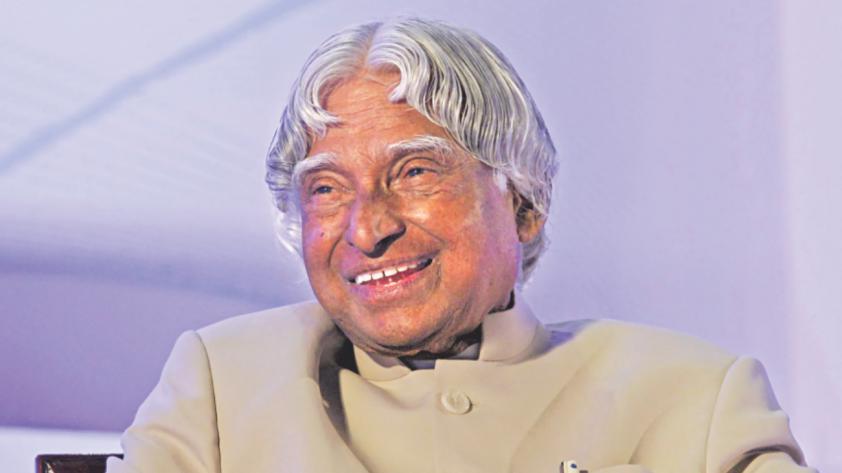Former Indian president APJ Abdul Kalam, who came to be known as “people’s president”, died yesterday after suffering a massive heart attack in Shillong, the capital of northeastern Indian state of Meghalaya.
Kalam, 84, collapsed while doing what he loved most to do — giving a lecture to students of the prestigious Indian Institute of Management in Shillong last night.
The former president, a bachelor, who would have turned 84 on October 15, was confirmed dead more than two hours after he was taken to the ICU of Bethany hospital in a critical condition following the collapse around 6:30pm.
Considered the most popular president, Kalam, a space scientist who was considered the chief
architect of India’s missile programme, became the 11th head of the state and occupied the post between 2002 and 2007, but a lack of consensus denied a second term in office for a man who came from outside political spectrum.
Meghalaya Governor V Shanmughanathan, who rushed to the hospital on hearing the news of his admission, said Kalam died at 7:45pm. Despite the doctors’ best efforts, he could not be revived.
Doctors from the army hospital and North Eastern Indira Gandhi Regional Institute of Health and Medical Sciences (NEIGRIHMS) rushed to Bethany hospital but their efforts proved to be of no avail.
Recipient of India’s highest civilian award Bharat Ratna, Avul Pakir Jainulabdeen Abdul Kalam rose from humble origins of selling newspapers at Rameshwaram Railway Station in southern Indian state of Tamil Nadu, his home state, to become the president in the most unexpected manner during the BJP-led NDA government under Atal Bihari Vajpayee after an all party consensus minus the left parties that saw him through in an election which he won handsomely.
An aeronautics engineer from Madras Institute of Technology, Kalam was considered the brain of missile programme in India. As chief scientific adviser to Vajpayee, he was also instrumental in the Pokhran nuclear test in 1998.
As president, Kalam utilised every opportunity that came to him to address students, especially schoolchildren, to dream big so that they became achievers in life.
A bachelor, the former president was a veena player and was deeply interested in Carnatic music. He was vegetarian all his life.
Kalam was closely associated with India’s civilian space programme and military missile development efforts, earning him the sobriquet “India’s Missile Man”.
He worked as a scientist and science administrator mainly at the Defence Research and Development Organisation (DRDO) and Indian Space Research Organisation (ISRO) before he became president.
After his five-year term as president, he returned to a life of education, writing and public service.
Prime Minister Narendra Modi condoled the death of Kalam and said he has lost a “marg darshak” who took India to new heights in the field of science and technology.
“He was a great scientist who contributed immensely in the field of science and technology as well as space. I have lost a marg darshark.
“He was a source of inspiration for the whole country, particularly the youth. Even in his last days, he remained connected,” Modi said.
“Dr Kalam was a man of impeccable character, indomitable spirit, profound knowledge and firm conviction. His death is an irreparable loss to this nation. He has left a big void hard to fill,” said Home Minister Rajnath Singh.
Abdul Kalam was born on October 15, 1931, in a poor Tamil Muslim family in Rameswaram. But he overcame all odds to study physics and aerospace engineering.
Kalam’s father owned boats which he rented out to local fishermen but Kalam himself began his career as a newspaper vendor.
A devout Muslim, Kalam joined the Defence Research and Development Organisation (DRDO) after studying physics and aerospace engineering from Madras Institute of Technology.
Mainly focusing on research in defence and space arena, he later engaged himself in India’s missile programme. His contribution to the ballistic missile and launch vehicle technology earned him the named as the “Missile Man of India”.
Kalam succeeded KR Narayanan and served a full five-year term from 2002 until 2007 after he won the presidential elections, which was a highly one-sided contest with Lakshmi Sahgal, a close aide to Netaji Subhas Chandra Bose and a revolutionary of Indian independence movement, as his rival. He secured the backing of most political parties.
During his tenure as president, Kalam came in for criticism for his inaction in deciding the fate of 20 out of 21 mercy petitions.
Kalam acted on only one mercy plea in his five-year tenure, rejecting the plea of rapist Dhananjoy Chatterjee, who was hanged thereafter.
Known for his unique interactive skills, Kalam made it a point to involve students in his speeches and lectures irrespective of their age-group.
Kalam was also awarded Padma Bhushan in 1981 and Padma Vibhushan in 1990.
He authored several books with “Wings of Fire”, “India 2020” and “Ignited Minds” being the most read best-sellers.
PM, KHALEDA MOURN KALAM’S DEATH
Prime Minister Sheikh Hasina yesterday expressed deep shock at the death of former Indian president APJ Abdul Kalam.
In a condolence message sent to Indian Prime Minister Narendra Modi, Sheikh Hasina said, “We’re deeply shocked at the sad demise of former president of India APJ Abdul Kalam, one of the most famous sons of India and a great scientific mind of his time. He was highly respected in Bangladesh as well.”
BNP chairperson Khaleda Zia also expressed profound shock at the death of Abdul Kalam.
In a condolence message, Khaleda said, “As a nuclear scientist, ex-Indian president APJ Abdul Kalam engaged himself in the welfare of people.”
Source: The Daily Star










